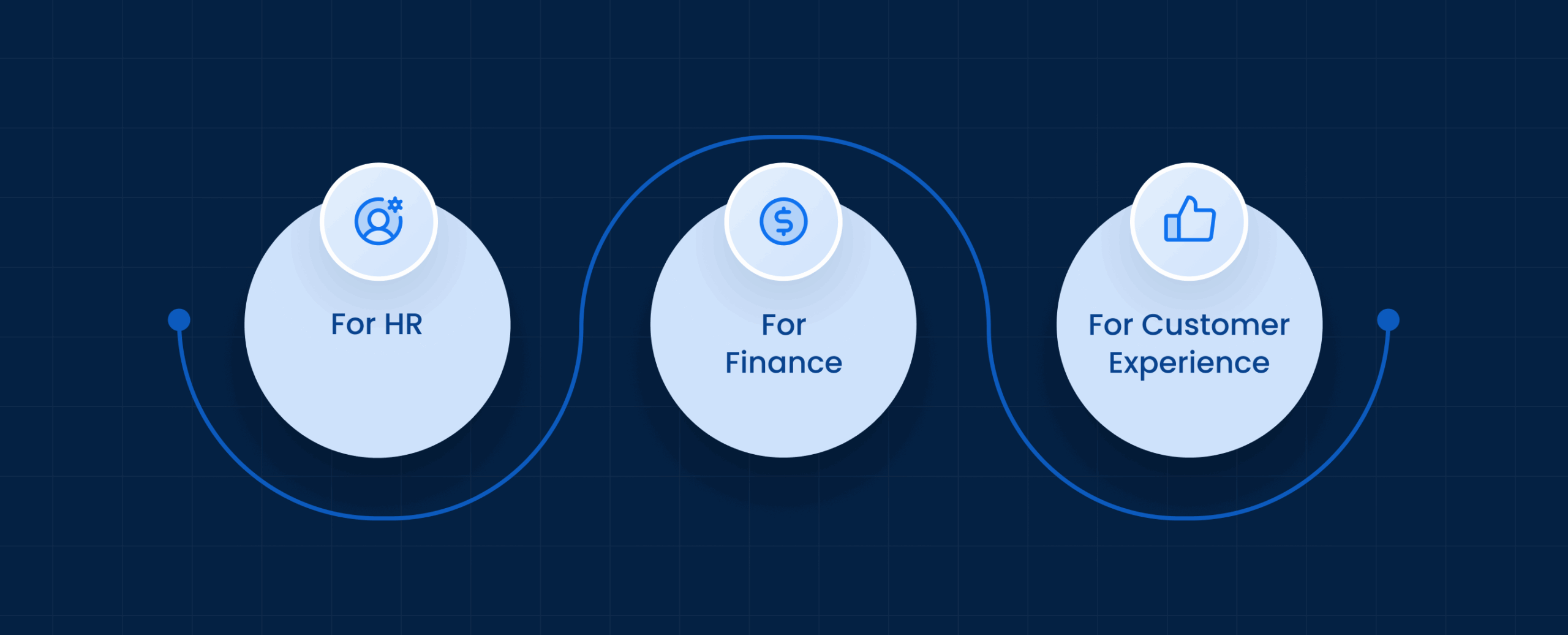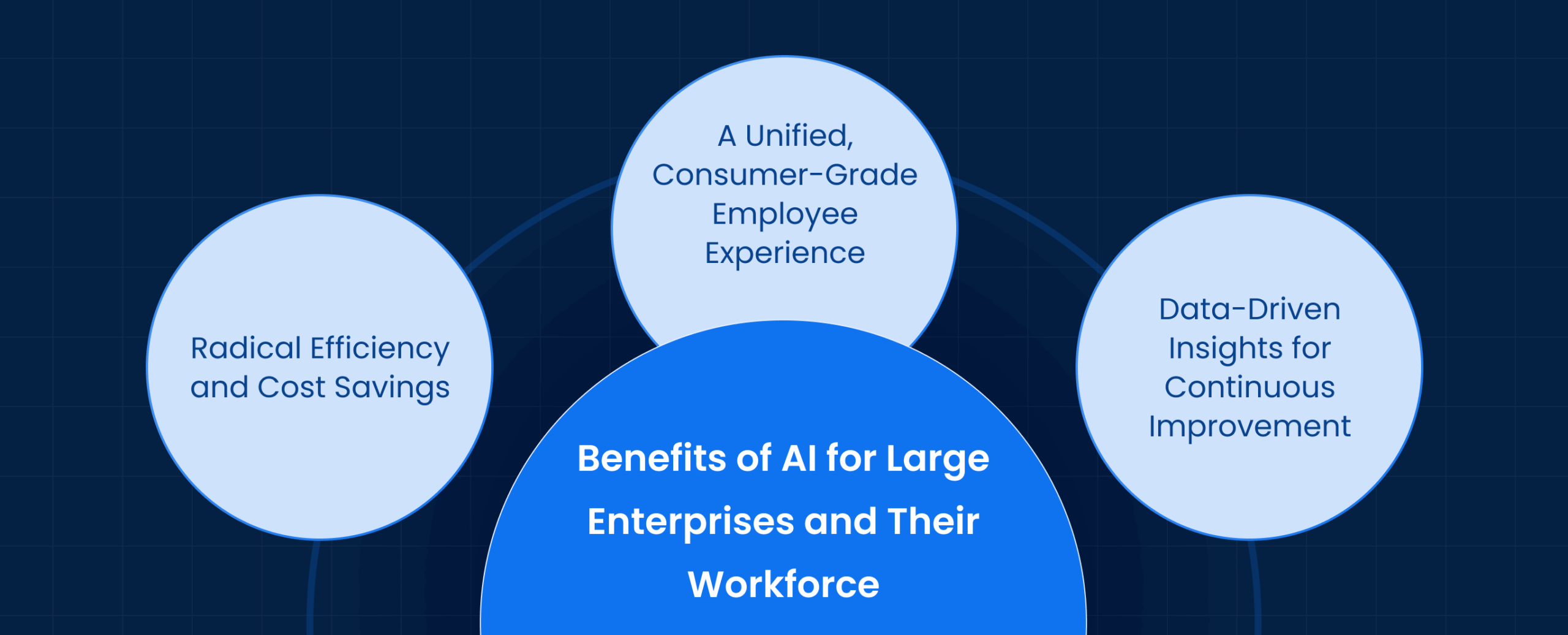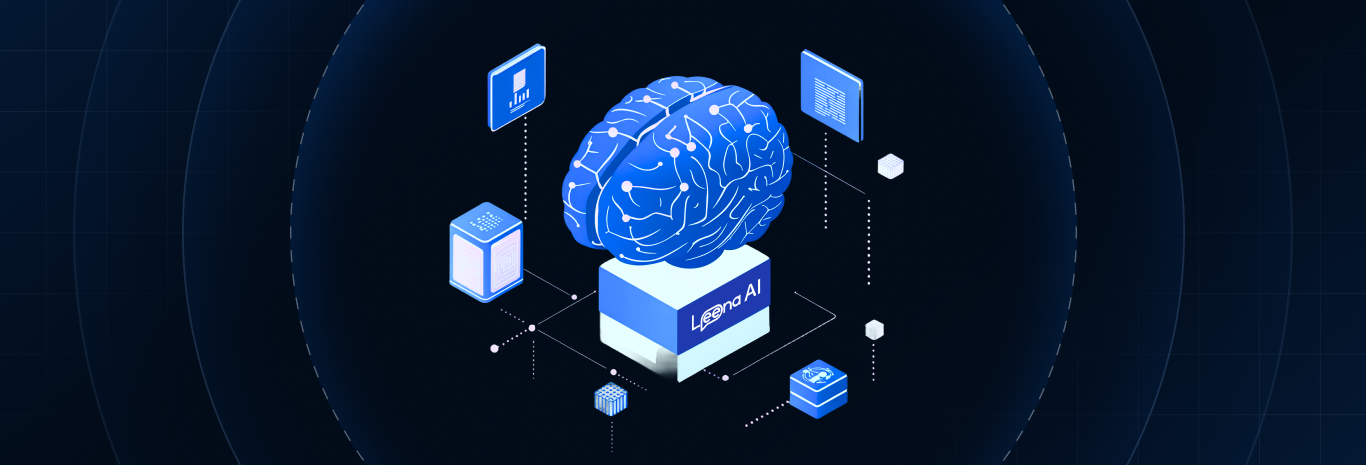Introduction
As a technology leader, you’re not just managing systems; you’re enabling the entire business. You know the constant pressure of the support ticket queue, a never-ending stream of password resets, software requests, and system issues that pulls your best people away from strategic projects. For years, the conversation has been about “ticket deflection.” But what if we could eliminate the ticket in the first place? That’s the new reality of AI in the Enterprise Workplace, and by 2025, it’s moving from a futuristic concept to a competitive necessity.
This guide is designed for you, the leader who needs to see past the buzzwords and understand the practical, high-impact applications of this technology. We’ll explore how AI in the Enterprise Workplace is evolving from simple chatbots into intelligent, autonomous agents that don’t just answer questions, they solve problems.
What is AI in the Enterprise Workplace, Really?
Let’s cut through the noise. At its core, AI in the Enterprise Workplace is about giving your employees a single, intelligent point of contact to get work done. Think of it less like a FAQ document and more like a hyper-efficient digital teammate.
Imagine hiring a new team member who instantly knows every company policy, has access (with the right permissions, of course) to all your business applications, and can perform multi-step tasks on an employee’s behalf. This digital teammate can reset a password in Salesforce, order a new laptop through your procurement system, and find a specific clause in a financial report, all from a simple request in Slack or Microsoft Teams.
This isn’t just about automation; it’s about orchestration. True AI in the Enterprise Workplace understands the user’s intent, connects to the necessary systems, and completes the task from start to finish. It’s the ultimate digital quarterback for your organization’s internal operations.
Key Use Cases of AI Across Enterprise Functions (IT, HR, Finance, CX)
While the potential is vast, the most powerful applications of AI in the Enterprise Workplace are focused on resolving the high-volume, process-heavy issues that bog down your core support functions.
Transforming IT Support: From Reactive to Proactive
Your IT team is the central nervous system of the company, but it’s often buried in reactive tasks. This is where AI in the Enterprise Workplace delivers its most immediate and profound impact.
- Proactive, Self-Healing Systems: The game-changer for 2025 is moving from reactive to proactive support. Instead of waiting for an employee to report that their laptop is slow, an AI agent can detect performance degradation from system logs. Consequently, it can automatically run diagnostics and clear the cache overnight. The employee never even has to file a ticket. This proactive approach to AI in the Enterprise Workplace is key.
- Intelligent Incident Management: When a critical system goes down, the clock is ticking. An AI agent can instantly analyze alerts from your monitoring tools, correlate them to identify the root cause, and create a single, context-rich ticket for your engineering team. Furthermore, it can automatically notify affected users and even initiate pre-approved remediation scripts, turning hours of chaotic troubleshooting into minutes of focused action.
- Effortless Onboarding and Offboarding: Setting up a new hire involves dozens of steps across multiple systems: creating accounts, granting permissions, ordering hardware. An AI agent can orchestrate this entire workflow from a single HR trigger. Similarly, it can ensure a secure and seamless offboarding process, revoking access across all platforms instantly.
Streamlining HR, Finance, and Customer Experience (CX)
The same principles apply across the business. Effective AI in the Enterprise Workplace unifies the support experience.
- For HR: Employees can ask, “How much PTO do I have left?” and get an instant answer. They can also initiate a leave request, update their personal information, or access benefits documents without ever leaving their chat window.
- For Finance: Teams can get instant help with expense report issues, check the status of a purchase order, or get clarification on a procurement policy, freeing up your finance experts for more strategic analysis.
- For Customer Experience: While often externally focused, internal CX benefits as well. Your support teams can get instant, AI-powered assistance on complex customer issues, pulling information from multiple knowledge bases and systems to provide faster, more accurate resolutions.

Benefits of AI for Large Enterprises and Their Workforce
Adopting AI in the Enterprise Workplace isn’t just about adding another tool to your tech stack. It’s a strategic move that delivers compounding returns.
- Radical Efficiency and Cost Savings: Every ticket an AI agent resolves autonomously is a direct cost saving. This isn’t about replacing people; it’s about freeing your highly skilled (and expensive) IT, HR, and finance professionals from repetitive, low-value tasks. As a result, they can focus on the complex, strategic initiatives that drive business growth.
- A Unified, Consumer-Grade Employee Experience: Your employees use seamless, intuitive apps in their personal lives. Why should their workplace technology be clunky and frustrating? Implementing AI in the Enterprise Workplace provides a single, simple interface to get help, mirroring the consumer-grade experiences they expect and eliminating the friction of navigating complex internal systems.
- Data-Driven Insights for Continuous Improvement: Your ticketing system is a goldmine of data. An AI platform can analyze thousands of conversations and requests to identify recurring issues and process bottlenecks. This provides you with actionable insights to improve underlying systems and processes, creating a virtuous cycle of continuous improvement. This is a core benefit of AI in the Enterprise Workplace.

How AI Enhances Productivity and Employee Experience
Productivity isn’t just about working faster; it’s about removing the small hurdles that disrupt focus and cause frustration. This is where AI in the Enterprise Workplace truly shines.
Consider the typical experience of a software access request:
-
The Old Way: An employee realizes they need access to a marketing analytics tool. They spend 10 minutes trying to figure out where to make the request. They find a generic portal, fill out a long form, and create a ticket. The ticket goes to the general IT queue. An L1 agent re-routes it. Eventually, it lands with the correct application owner, but it needs a manager’s approval. The process takes three days, filled with back-and-forth emails, and the employee is blocked the entire time.
-
The New Way with AI: The employee simply messages the AI agent in Slack: “Hey, I need access to Tableau.” The agent understands the request, confirms their manager, sends an approval request directly to the manager’s chat, and upon approval, automatically provisions the access via an API integration. The entire process takes less than five minutes.
That’s the tangible difference. By eliminating these “micro-frustrations” at scale, AI in the Enterprise Workplace gives back countless hours of productive time and dramatically improves how employees feel about working at your company.
The Future of AI in Enterprise Workplaces: From Assistant to Agent
The next evolution of AI in the Enterprise Workplace is the shift from digital assistants to autonomous agents.
- An Assistant can find information. You ask it for a policy, and it gives you a link to the document.
- An Agent can take action. You ask it to file an expense report, and it prompts you for the details, connects to the finance system, and completes the task for you.
This is the concept of Agentic AI. It’s a network of specialized AI agents that can reason, plan, and execute multi-step tasks across different enterprise applications. An IT agent can collaborate with an HR agent and a Finance agent to complete a complex process like an international employee transfer, all without human intervention. This vision of an interconnected, autonomous AI in the Enterprise Workplace is where the industry is heading.
How Leena AI is Transforming the Enterprise Workplace with Agentic AI
At Leena AI, we are at the forefront of this evolution. We build enterprise-grade AI agents that are designed to do more than just talk, they are built to act. Our work in Agentic AI is specifically designed to solve the challenges you face in managing large-scale IT, HR, and finance support.
Instead of just deflecting tickets, Leena AI’s platform focuses on autonomous resolution. For your IT department, this means our AI agent can:
-
Automate Incident Resolution: Securely perform actions like restarting servers, flushing DNS caches, or clearing application errors based on diagnosed issues.
-
Fulfill Complex Service Requests: Handle multi-step requests like “set up a new project environment in AWS for the design team,” which involves provisioning resources, assigning permissions, and notifying the relevant stakeholders.
-
Orchestrate Self-Healing Infrastructure: Integrate with your monitoring tools to not only detect but also autonomously fix underlying infrastructure problems, ensuring that your systems and your employees stay productive.
We are helping leading companies transform their support functions into proactive, efficient, and employee-centric operations. By pioneering Agentic AI, Leena AI is building the future of the AI in the Enterprise Workplace today.
Conclusion: Your New Strategic Advantage
The implementation of AI in the Enterprise Workplace is no longer a question of “if,” but “when.” As we look toward 2025 and beyond, the organizations that thrive will be those that empower their employees with intelligent, autonomous tools that eliminate digital friction.
By moving from a reactive support model to a proactive, agent-driven one, you can unlock significant cost savings, boost workforce productivity, and build a world-class employee experience. This isn’t just an upgrade for your ticketing system; it’s a fundamental shift in how work gets done, and it represents your next major strategic advantage.
Frequently Asked Questions (FAQs)
1. What is the first step to implementing AI in the Enterprise Workplace?
The best first step is to identify your most frequent and time-consuming support requests. Start with a focused use case, like password resets or software access requests, to demonstrate value quickly before expanding the scope of your AI in the Enterprise Workplace initiative.
2. How do we measure the success and ROI of an AI implementation?
Success can be measured through a combination of “hard” and “soft” metrics. Hard metrics include a reduction in ticket volume, decreased resolution times (MTTR), and direct cost savings. Soft metrics include improvements in employee satisfaction scores (CSAT/NPS) and qualitative feedback on the employee experience.
3. Is AI in the Enterprise Workplace secure?
Enterprise-grade AI platforms are built with security as a primary concern. They should offer robust data encryption, secure integrations, and granular access controls to ensure that the AI only accesses the information and performs the actions it is explicitly permitted to, in compliance with standards like SOC 2 and ISO 27001.
4. Will AI replace our existing IT service management tools?
No, a powerful AI solution should integrate with and enhance your existing systems, like ServiceNow, Jira, or Workday. The AI acts as an intelligent “engagement layer” that makes these powerful systems more accessible and efficient for both your employees and your support teams.
5. How does Agentic AI differ from a standard chatbot?
A standard chatbot is primarily conversational; it finds and delivers information. Agentic AI in the Enterprise Workplace is action-oriented; it integrates with other business applications to execute tasks and complete processes autonomously on behalf of the user













